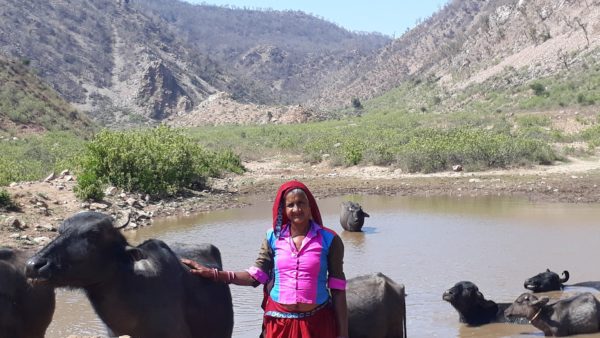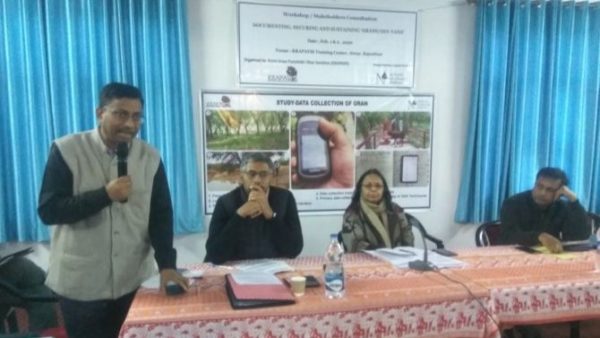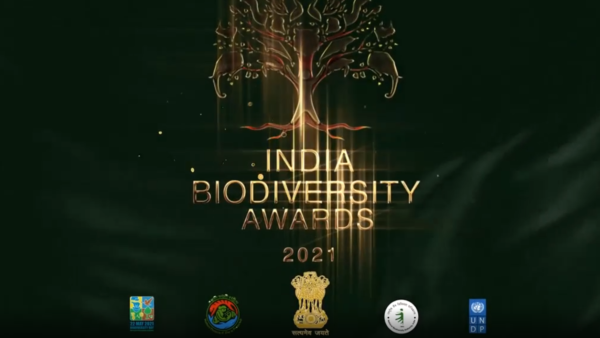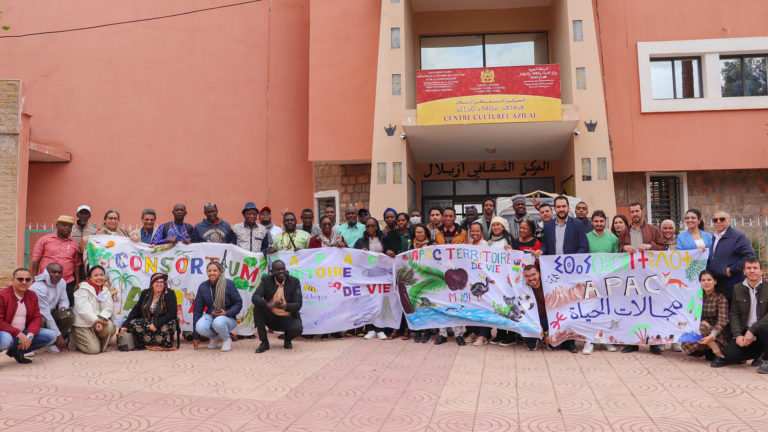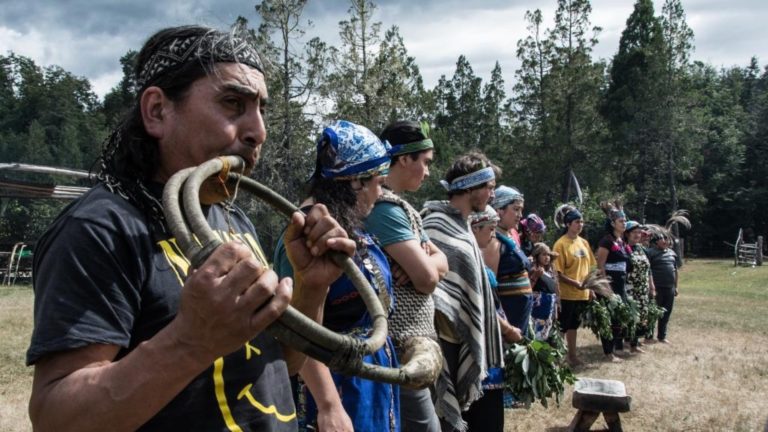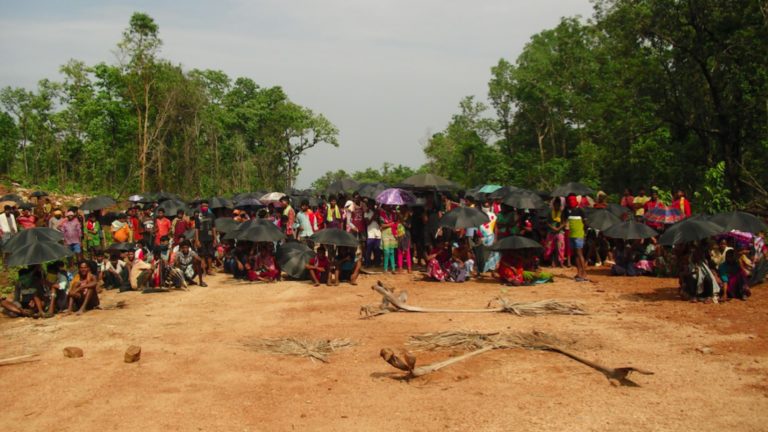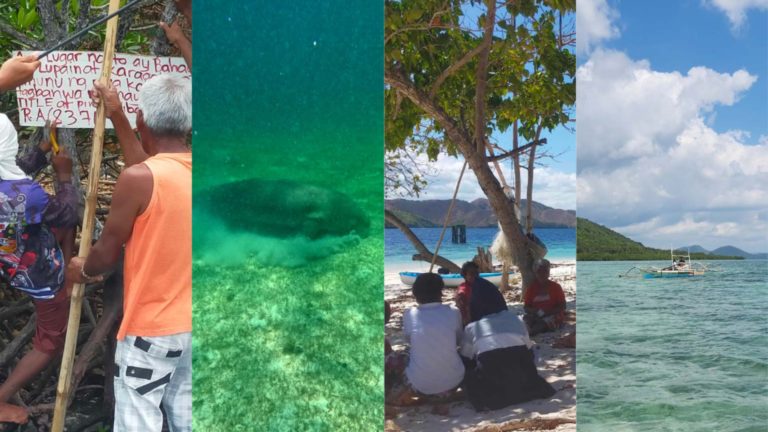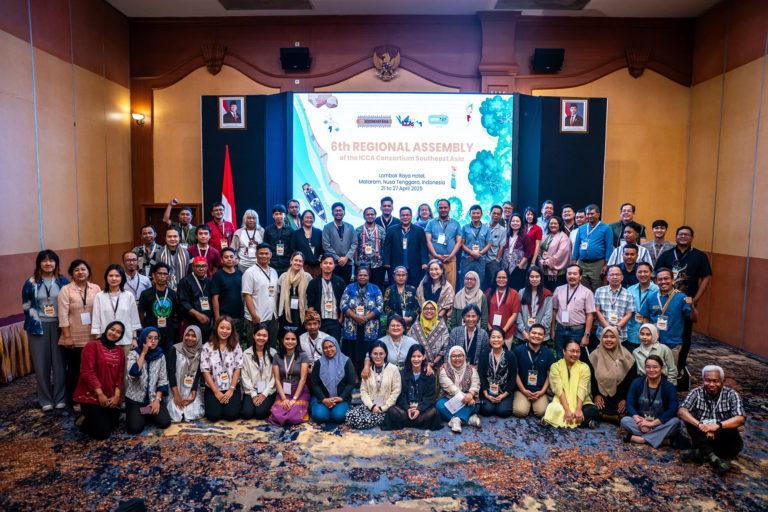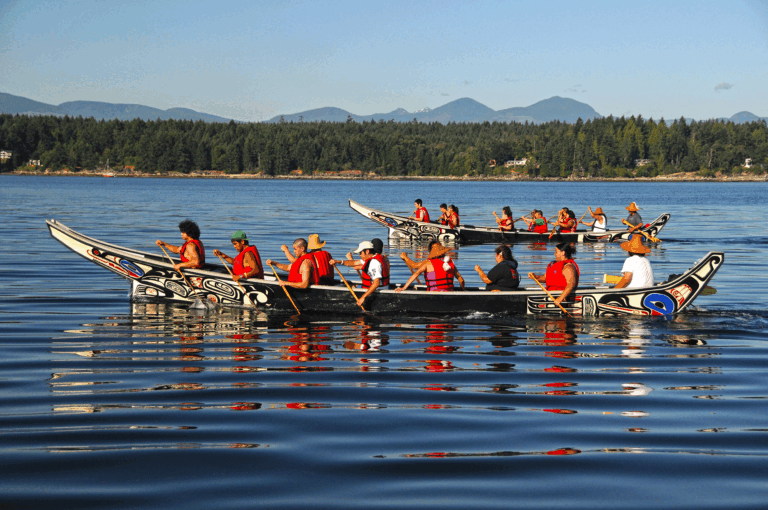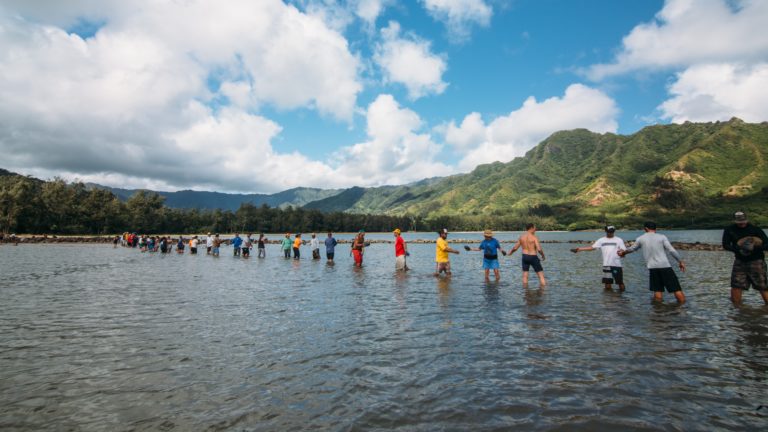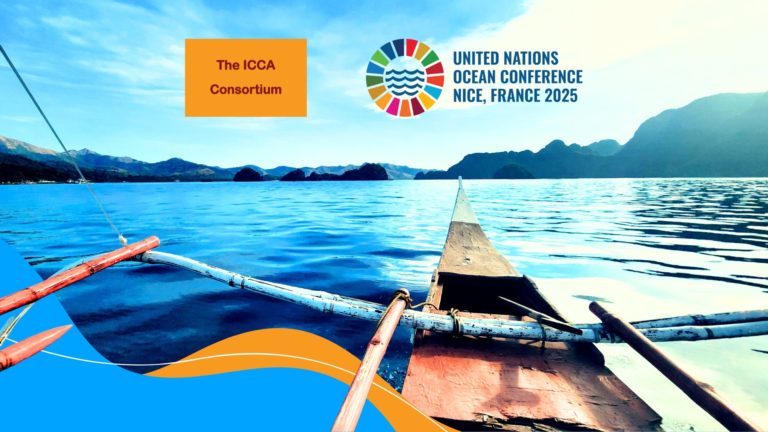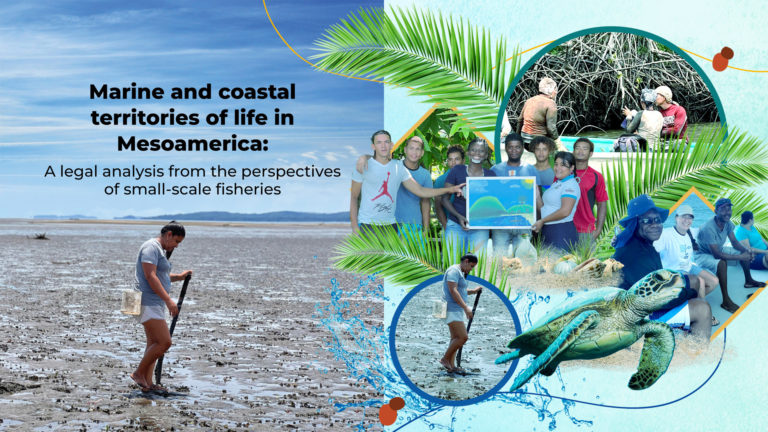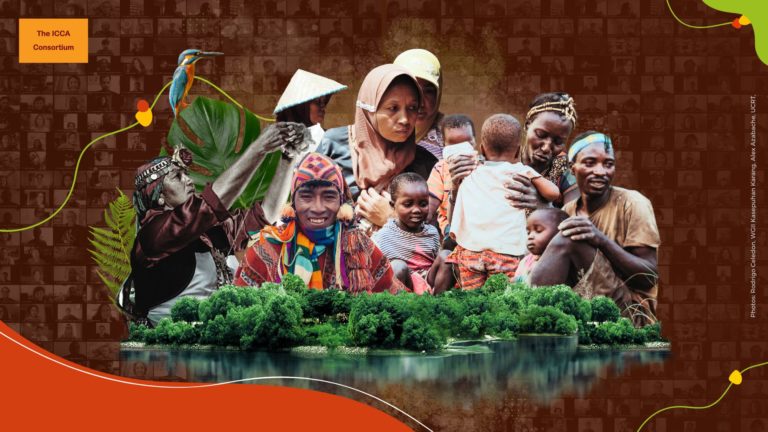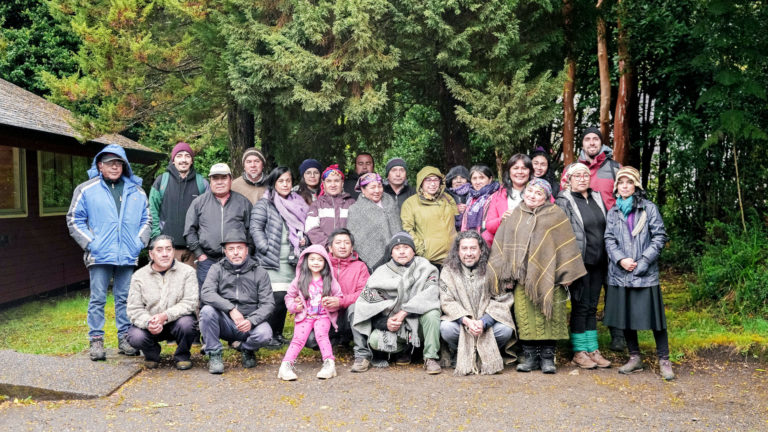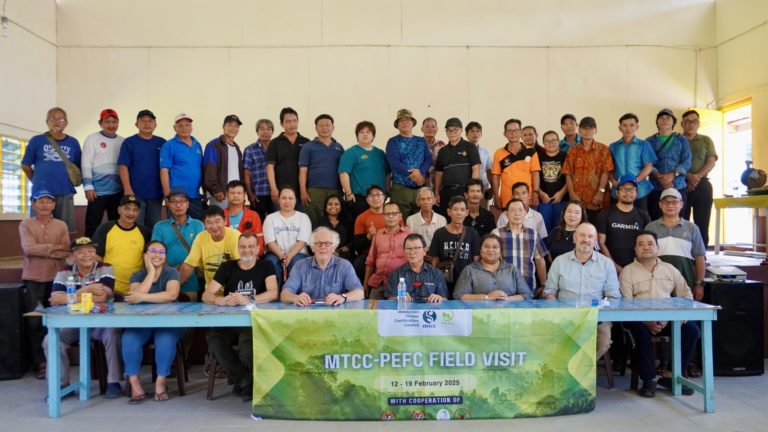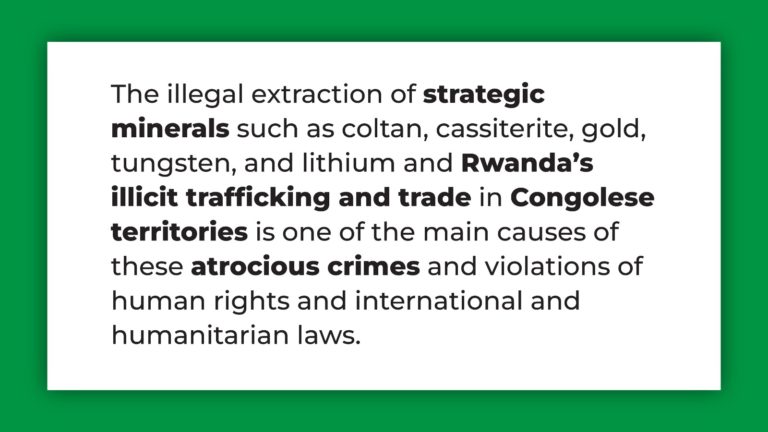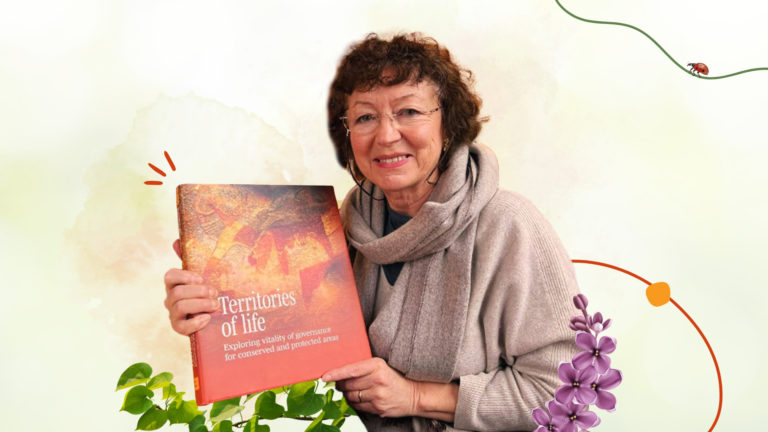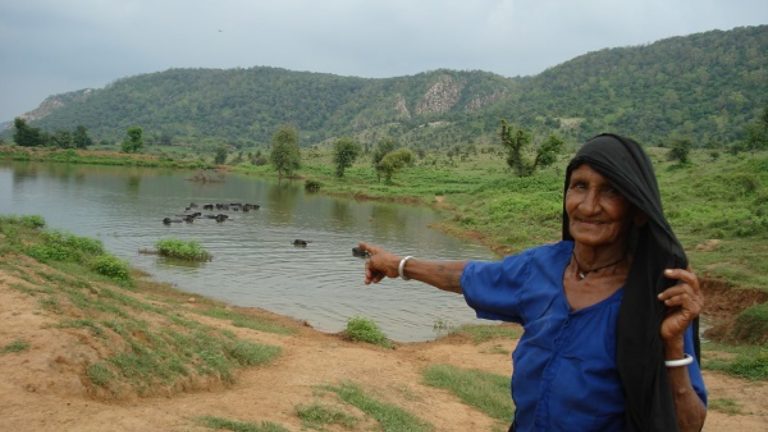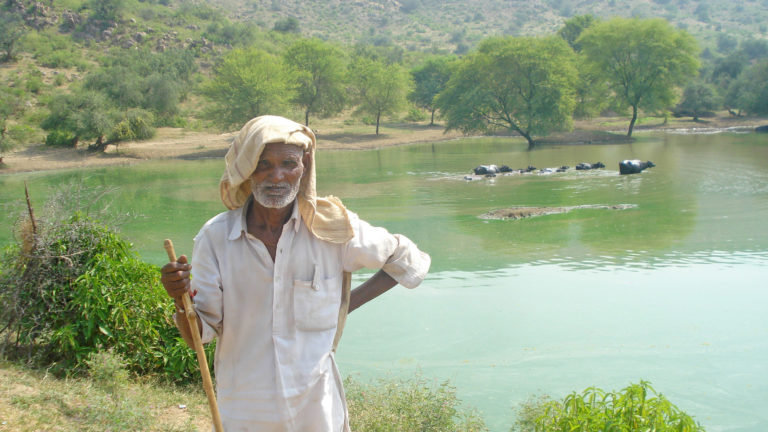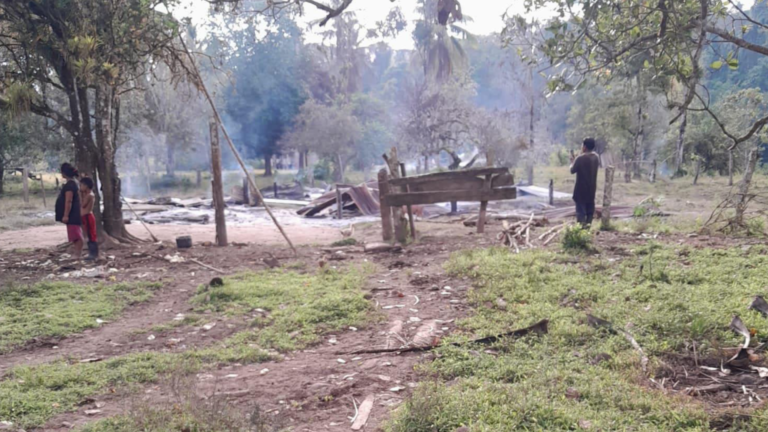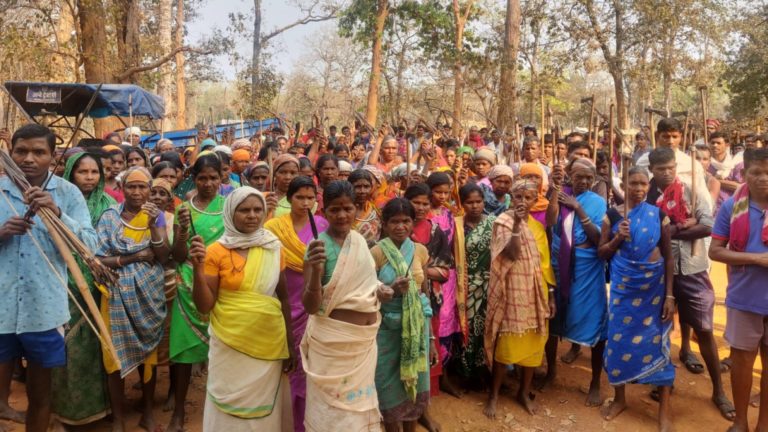By Aman Singh and Shruti Majumdar
Krishi Avam Paristhitiki Vikas Sansthan (KRAPAVIS), ICCA Consortium Member
Krishi Avam Paristhitiki Vikas Sansthan (KRAPAVIS) organized a Community Training Program from 26th to 29th September 2023 in the Oran Training Centre in Alwar, Rajasthan, India. The workshop aimed to provide training to desert pastoralist communities to equip them with the knowledge and skills necessary for conserving and protecting Orans—the sacred groves of Rajasthan—while ensuring their livelihoods’ security.
A range of diverse themes regarding the Orans were explored and thoroughly discussed in various workshop sessions. Furthermore, the participants gained practical insights and hands-on knowledge through field visits, enhancing their understanding and preparedness for preserving Orans.
The workshop had diverse participants, mostly hailing from the Orans of the Thar desert. Distinguished senior scientists and representatives from various government agencies and NGOs were also in attendance as resource persons. This mix of attendees contributed to a rich and varied knowledge exchange and experiences during the workshop.
In his opening speech, Shri Aman Singh, the founder of KRAPAVIS, provided an insightful overview of the history of Orans. He delved into the various uses of water structures within these Orans and explored the diverse practices in different Orans across the region. Mr. Singh also highlighted the rich flora and fauna that inhabit these unique ecosystems.
He emphasized how the livelihoods of many communities depend on the sustainability of Orans while highlighting the pressing threats, such as encroachments spreading of invasive species, that these ecosystems face. He emphasized using geographic information system (GIS) tools and satellite imagery to identify and map Orans to enhance understanding and conservation efforts.
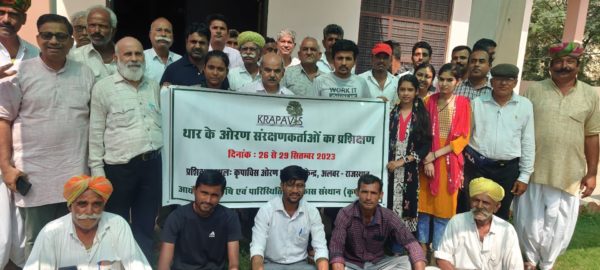
This comprehensive discussion gave the participants a holistic understanding of the importance, challenges, and potential solutions for challenges in Orans. Also, it provided an overview of the organization KRAPAVIS and its vital role in supporting desert communities in the conservation of Orans and safeguarding their livelihoods.
KRAPAVIS takes a multi-faceted approach involving the documentation of Orans and dev-vans and their restoration and long-term sustainability through active community engagement, awareness initiatives, training programs, and policy advocacy. They have established a platform called Oran Forum, which is devoted to activities aimed at preserving and protecting these sacred groves. It also publishes“Oran-Devbani re Baat,” a magazine designed to disseminate crucial information and promote awareness regarding Orans and their invaluable role in local communities’ lives.
The day’s second session was conducted by Dr. Sitaram Verma, an eminent veterinary doctor based in Alwar, Rajasthan. During his informative talk, Dr. Sitaram Verma discussed various diseases affecting animals and their corresponding treatment methods. He emphasized the timely administration of vaccinations, underlining their vital role in safeguarding animal health. Dr. Verma delved into specific ailments that plague cattle, such as thaneda, baang, and lumpy, and also explained common diseases like pipia and mata ki bimari, generally seen in goats and sheep. In addition to providing valuable insights into disease management, he urged the farmers and the Oran conservationists to foster innovation and creativity in their livestock management to enhance profitability, highlighting the dynamic nature of the business.
Dr. J.P. Singh, a retired senior scientist from Central Arid Zone Research Institute (CAZRI), underscored the crucial significance of biodiversity within Orans. He elucidated how Orans harbor climax species, offering a unique ecological niche. However, he expressed concern about the declining state of important grasses in Jaisalmer, such as Sevan, Dhaman, and Karad, under immense pressure due to grazing activities. Shrubs like Guggal and Gangeran suffer from intense grazing by goats and sheep.
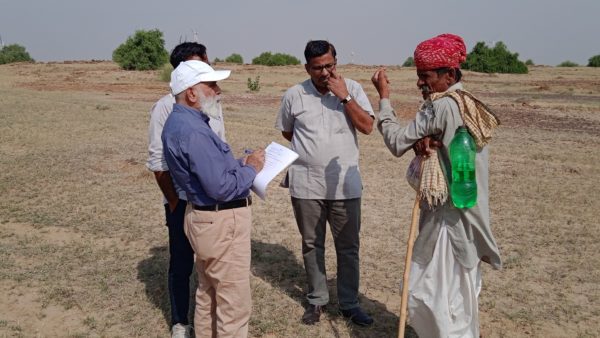
Dr. Singh stressed the importance of preserving local species of shrubs and trees like Murath, Kerr, Lana, Phaag, Khejri, Peelu, Kumath, etc. He also highlighted how iconic species like the Godawan, Tillor, vultures, and various snakes are at risk due to their habitat destruction. In conclusion, he urged in situ conservation efforts to safeguard these ecosystems, emphasizing the need to preserve and protect the seeds of indigenous trees and plants for future generations.
In the workshop, emphasis was put on traditional knowledge and local uses of various plant species within these ecosystems, the pivotal role of Indigenous traditions in nurturing them, and the urgency to transmit this wisdom to the younger generation, which was particularly compelling. It also underscored the importance of conserving these precious habitats by eradicating invasive species and promoting the growth of local and native species.
A dedicated session was arranged to address the various threats confronting Orans. Several key factors contributing to these challenges were identified, including the expansion of agricultural activities into these natural habitats, the proliferation of invasive species, the ambiguous legal status of Orans, issues of encroachment, and the consequences of over-grazing and non-documentation of Orans.
The discussions also underscored the significance of social fencing, the active involvement and participation of local communities, the influential role of Gram Panchayat, and the need for solid determination to tackle these challenges effectively. In summary, it was emphasized that a combination of collective action and unwavering resolve is the way forward in mitigating the threats faced by these vital ecosystems.
After the morning session, a participant named Aamsingh from Jaisalmer delivered a vibrant and spirited poem that infused the workshop with refreshing energy.
A session was conducted by Mrs. Pratibha Sisodia Shri Dharmendra Kumar, who is associated with KRAPAVIS and passionately advocated for establishing village-level women’s committees dedicated to preserving and protecting Orans. Recognizing women’s pivotal role in raising awareness, enhancing productivity, and maintaining these precious ecosystems, he underscored the importance of organizing them into committees.
Shri Ramavtar Sharma of the KRAPAVIS organization conducted another session and delivered a thorough presentation, delving into the intricacies of the Oran Survey Form meticulously crafted by KRAPAVIS. He meticulously walked the participants through all 129 questions in the survey form with precision and dedication. His detailed explanation of each question and insights into the rationale behind their inclusion shed light on this survey’s vital role in documenting the Orans.
Shri Sharma’s comprehensive presentation provided a valuable resource for understanding the survey process. It highlighted the significance of these questions in achieving the overarching goal of preserving and documenting these vital ecosystems.
During the training, a vital task for the participants was to urge them to fill out the forms provided by KRAPAVIS. These forms were crucial for collecting essential information regarding their respective Orans.
Participants were required to furnish details regarding their socio-cultural and religious practices observed at the Orans, the diverse water structures present within these ecosystems, describe the diverse flora and fauna inhabiting these ecosystems and the underlying reasons for their decline, various tangible and intangible benefits bestowed by these natural havens, the process of demarcating Oran boundaries, the perspective of the youth on Orans and prevailing threats to these Orans.
Additionally, participants were encouraged to craft a narrative that conveyed the unique story of their respective Orans, thereby contributing to a richer tapestry of knowledge and appreciation for these invaluable ecosystems.
After the session, the participants embarked on an enriching field trip, exploring three captivating sites.
Shri Rajender Mewara conducted the last session. He is currently working with KRAPAVIS as a GIS resource person, shedding light on their pivotal role in crafting detailed mapping of Orans. He provided an extensive overview of the methodologies employed within these techniques.
Reflection from a participant
Shruti Majumdar
Research Scholar, Department of Humanities and Social Science at BITS-Pilani
Attending this workshop as a budding researcher has provided me with a truly unique and enriching experience that will undeniably play a pivotal role in shaping the direction of my research.
The insights gained from the participants from the local communities and the distinguished experts have been invaluable, shedding light on the significance, practices, and challenges linked to sacred groves.
This workshop has paved the way for me to identify potential fieldwork sites for my research work. After delving into the theoretical aspects of my research, this workshop offered me practical insights into the study of sacred groves.
These valuable experiences have undoubtedly enriched my understanding and opened new horizons in my research. I have been particularly inspired by the community’s active involvement and collective action in safeguarding the Sacred Groves.
Witnessing the enthusiasm with which the local inhabitants come together to protect these hallowed natural spaces has profoundly impacted me. Their unwavering dedication to preserving the ecological and cultural significance of the sacred groves is a testament to the power of community engagement in conservation efforts. This experience has ignited a renewed sense of hope and motivation in my dedication to my research work.
The networking opportunities have been equally rewarding, as they have allowed me to establish connections with experts, local stakeholders, and fellow researchers, opening the door to potential collaborations and data collection. The workshop’s success was undoubtedly driven by all its attendees’ active participation and collective enthusiasm.
